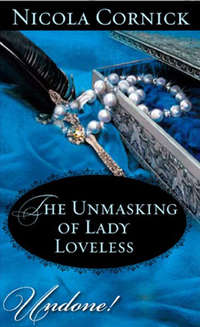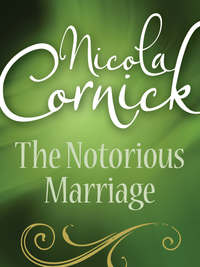
Полная версия
Deceived
The priest touched her arm.
“You will be wanting to be away from this place, ma’am. Allow me to escort you out.”
Isabella followed him in something of a daze through the warren of shadowed corridors and out into the daylight. The door clanged shut, leaving her out on the street. The air was bright and the afternoon was loud with the vibrant noises of the city. She felt very odd, light-headed and confused, as though she had awoken from a vivid dream, a dream laced with sensuality and long-buried desires. Except that this had been no dream. She was legally married to Marcus Stockhaven—or perhaps illegally, given the circumstances of their wedding. The thought made her heart clench with emotion.
His signet ring felt heavy and unfamiliar on her finger. She wondered why he had not pawned it to buy himself more comfort. But a man’s pride was a delicate thing and maybe selling off the family’s arms was a step too far, even for a debtor in dire straits. He could scarce be said to have graced the Stockhaven name with his behavior.
He had not sold his signet ring but he had given it to her. Isabella felt a passing regret for the fact that she could not wear it. Nevertheless, she would keep it safe, and once the marriage had been annulled she would send it back to him. No matter that he had said they would meet again. She knew it would be better—safer—never to see him.
She could feel the marriage certificate stiff in the reticule beneath her arm. She was free and she was secure from arrest, and surely that had to be the most important matter. Yet as she walked quickly out of the labyrinth of alleys that snaked about the Fleet, a deep feeling of disquiet possessed her. She wondered why she was so anxious. After all, Marcus was locked up in debtor’s prison and she was at liberty to carry on as though nothing had happened. She had exactly what she wanted.
For a moment she contemplated what might happen if Marcus were to regain his freedom and a shiver of apprehension shook her. With Marcus imprisoned, she felt safely in control of the situation. Marcus at liberty would be a very different matter. There was no way one could control a man like that. He was too strong, too forceful.
She turned her face up to the sunshine for comfort and told herself that it was impossible that Marcus would ever be free. Her debts would be dismissed, her inheritance would be proved and then she could pay for an annulment. She had no cause ever to see him again.
Nevertheless, she felt afraid.
MARCUS WAS LYING on the mattress in the empty cell, which was now his own, the book about naval architecture lying untouched by his elbow and a bottle of wine almost as untouched beside it. The cell looked exactly as it had when he had stepped in there in the weak light of morning. There was nothing to show that Isabella Di Cassilis had ever been there and in doing so had changed his life. There was no sign of her, yet her presence lingered in the air and wrapped itself about him so that it was impossible to think of anything else.
During the preceding twelve years he had thought about Isabella sometimes, but he would dispute that he had ever pined for her. His mouth twisted in bitter amusement. He was not a man to dwell on those things that might have been. He was not cut out to be a martyr. Bur while he had always believed that he had put the entire matter of his ill-fated, youthful love affair behind him, he now knew that was not so. Now he knew he wanted Isabella and he wanted a reckoning.
Marcus rubbed a hand across his eyes. He had tried very hard to shut Isabella out of his mind and his life, but he had not been able to ignore the tales entirely. Her husband’s name had been a byword for depravity, especially in his later years when he had traveled through Europe trailing a raffish court behind him like a wayward comet and taking with him a wife whose name was inevitably ruined by association with his debauchery. Marcus thought of Isabella and the crippling blow that her late husband had dealt her. Twenty thousand pounds was an immense debt to burden her with, but no doubt the feckless Prince Ernest had cared as little for that as he was reputed to have cared for his wife. And one could argue that it was only just that Isabella, who had married for money, should in her widowhood be crippled by debt.
Marcus shifted, trying to achieve a more comfortable position on the hopelessly uncomfortable mattress. Isabella had chosen to marry Prince Ernest and she was now reaping the consequences of that decision. She had jilted Marcus heartlessly to marry a rich and titled man. That was the simple truth. Marcus had fallen for the charms of an adventuress.
He had not wanted to feel anything for Isabella Di Cassilis when he met her again. He had wanted to look at her and feel nothing—no love, no hatred and certainly no desire. He had failed singularly. It had taken him all of ten seconds to realize that he still wanted her and, when she had trembled under the onslaught of his kiss, he had forgotten the grim surroundings of the Fleet and ached to take her there and then on the cold stone floor of the chapel.
No indeed, indifference was the last emotion on his mind.
Marcus got to his feet and walked over to the small grille that covered the window. Tantalizing brightness flooded in, promising all the things that he had given up—light and liberty and the freedom to do whatever he wished. He had gone voluntarily into the Fleet for a most particular purpose and Isabella’s assumptions about his financial state, while logical, could not have been further from the truth. He could buy up her debts three times over and not notice the difference.
He paused, staring at the small square of light. What did he want from Isabella Di Cassilis? She had chosen him for no more reason than that he was a convenient husband in the same way that she had made a calculated decision to marry Prince Ernest all those years before. Marcus had given her the freedom to escape her debts. He owed her nothing more. But she…she owed him an explanation of the past as well as a reckoning for the present. When he paid off her creditors, she would owe him a great deal more.
His work here was almost complete. He had been intending to call for his release in a week’s time anyway, but that could easily be brought forward by a few days. It was probably preferable to leave now anyway. Isabella’s visit, and her largesse, had made him a figure of curiosity and that he could not afford. Already there was a buzz in the air, talk of his wife’s beauty and speculation about her true identity. Secrets could not be kept in a place like this.
Marcus stared up at the small blue square of sky above his head. He did not deceive himself that Isabella would be pleased to see him at liberty. If there was one thing he had learned from their interview, it was that Princess Isabella Di Cassilis—or more accurately, the new Countess of Stockhaven—did not wish for a husband in anything more than name.
Marcus grinned. Too bad. She was about to get one. There was business unfinished between them.
He called for a pen and ink, spending one of Isabella’s guineas lavishly on the privilege of having the letter delivered immediately to an address in Brook Street.
The note was very simple:
Alistair, my plans have changed. I rely on you to get me out of here with great despatch. My thanks, S.
He paused, then added a postscript.
Pray find out for me, if you would, who are the major creditors of Princess Isabella Di Cassilis.
The turnkey was waiting to take the note. Marcus knew the man would fulfill his commission. The jailers in the Fleet had a fine instinct for power and they could sniff the change in Marcus’s fortunes.
This, they knew, was a man who would soon be free.
CHAPTER FOUR
MR. CHURCHWARD THE ELDER, of the renowned London firm Churchward and Churchward, lawyers to the noble and the discerning, was startled to receive a visit early the following morning from no less a personage than Princess Isabella Di Cassilis. He had seen the princess only the day before, when he had had the melancholy duty of informing her of her late husband’s appalling debts. Princess Isabella had taken the news well and had promised him that she would apprise him shortly of the steps that she meant to take to clear the sum. It seemed that she had already found a solution.
Mr. Churchward came forward, hand outstretched. Had Princess Isabella not already been seated, he would certainly have dusted the chair for her. Although he professed a total impartiality toward all his clientele, it was in fact the case that Princess Isabella was one of Mr. Churchward’s most favored clients. The lawyer had some very chivalrous ideas about ladies in distress and he would have liked nothing more than to see a hero on a white charger ride to the rescue of this particular courageous lady. Unfortunately he was not that man. He was only her lawyer.
“Madam!” He took her hand and shook it warmly. “There was no need for you to come to my chambers. I should have been delighted to call upon you.”
“I would not dream of putting you to so much trouble, Mr. Churchward,” Isabella said with a smile that made Mr. Churchward tingle down to his toes. “This is a simple matter and will take a mere moment. I have come to settle my debt and I wondered whether you would deal with Henshalls for me?”
“Of course!” The lawyer shuddered to think of a lady as delicate as the Princess setting foot in the moneylenders’ offices. Not that Princess Isabella appeared fragile, precisely. A lady who had survived the rigors of marriage to the feckless Prince Ernest was to be congratulated on her hardiness. Mr. Churchward shook his head. His expression said all that was needed on the subject of profligate princes who ran through a fortune and then proceeded to accumulate debt with the gusto that others collected paintings or Grecian antiquities. Irresponsible, foolish, selfish, callous and downright unpleasant were descriptions of Prince Ernest that might have sprung to Mr. Churchward’s lips had he been less discreet. His mouth compressed to a thin line as he regarded the lady who was obliged to reap the consequences of Prince Ernest’s financial recklessness.
The princess gave him another of her mischievous smiles, which set his blood pressure awry and caused him to blush deeply. Delving in her reticule, Princess Isabella extracted a piece of paper.
“I believe that Henshalls will find this in order,” she said sweetly. “They will not care for it much, but they cannot argue with it.”
Mr. Churchward, who had expected to be holding a money order, found that he was in fact clutching a marriage certificate. Further perusal confirmed that it was for a marriage contracted in the Fleet Prison. Accompanying it was a note that stated that a certain John Ellis was prepared to take on his wife’s debts in their entirety.
Mr. Churchward gasped and adjusted his spectacles, the better to confirm the news his sinking heart was telling him.
“But madam…I…You…”
“I took your advice, Mr. Churchward,” Isabella said, “and arranged a marriage. You will find that it is quite legal.”
Mr. Churchward was flushed with agitation. The certificate dropped from his nerveless fingers to the wooden table. He moved several files agitatedly and at random, upsetting the ordered calm of his desktop.
“My advice was to marry a gentleman of fortune, Princess, not a debtor!” he spluttered. “Upon my word, madam, I cannot believe—” He broke off and scanned the sheet of paper. “It is legal, you say?”
“Of course.” Isabella looked very collected. “It is also temporary. As we agreed yesterday, Mr. Churchward, I would like you to place the house in Brunswick Gardens up for sale. I think it will fetch a goodly sum, for it is in quite a fashionable neighborhood. Once the sale is made and Aunt Jane’s legacy is also proved, I will pay Henshalls what I owe them.”
Mr. Churchward made a whimpering noise like a cat inadvertently trodden upon. He removed his glasses and polished them feverishly. The dent that they had left on his nose was bright red against the pallor of the rest of his face. Even his voice sounded pale.
“And the marriage, madam?”
“I will end that as well, of course.” Isabella snapped her reticule shut with a decisive click. “It is a matter of convenience only. Mr. Ellis will be confined to the Fleet for the foreseeable future.”
Various objections flitted through Mr. Churchward’s mind. Doubtless the princess, like many other persons unacquainted with the law, thought that it was relatively simple to achieve an annulment of a marriage. Most people erroneously assumed that non-consummation was sufficient grounds. He started to rehearse the explanations in his mind, saw the decisive set of Isabella’s jaw, and decided to bide his time. It was, after all, too late. Part of the skill in dealing with his noble clients lay in choosing one’s moment. This was not the right time to suggest to the princess that she might in fact be wed for better or worse.
Mr. Churchward mopped his forehead with his large, practical handkerchief.
“I shall not take any more of your time, Mr. Churchward,” Isabella said. She gave him a final, very sweet smile. “I shall be leaving Town for my house in Salterton in a few weeks, but I should be delighted to entertain you to tea before I go.”
“Salterton…Of course…We must speak further about your inheritance….” Mr. Churchward mumbled. Another raft of objections came into his mind. He had not yet had the chance to speak to Princess Isabella in detail about her legacy from her aunt, Lady Jane Southern, for other more pressing matters had taken precedence. He wondered how much the princess knew about her inheritance of Salterton Hall and the encumbrances upon the estate.
Churchward mopped his brow again. Should he acquaint her with the difficulties now, and explain the very delicate nature of her relationship with her tenant in the dower house? He hesitated. Best not. Isabella was already on her feet in preparation for leaving. He did not wish to detain her now.
“Perhaps we might make an appointment for next week, madam,” he suggested. “I would appreciate the opportunity to acquaint you with the detail of your estate.”
Isabella nodded.
“Thank you, Mr. Churchward. Will Tuesday be convenient?”
She was already halfway out of the door, leaving nothing but a faint, delicious perfume shimmering in the air. Churchward heard her give an airy farewell to the staff in the outer office; there was the sound of her steps on the stairs, gathering speed as though she were rid of some tiresome encumbrance. Mr. Churchward smiled wryly. By the time she reached the street she would be almost running.
He perused the marriage lines and the promissory note for a third time. His hand stole toward the drawer of his battered cabinet, where a bottle of sherry was hidden for emergencies. This was a full-scale emergency if ever there was one. He paused. It would, however, be better to deal with Henshalls first. He did not relish giving those most ruthless of moneylenders the news that Princess Isabella Di Cassilis’s debts were now impossible to claim, the responsibility of some luckless wastrel in the Fleet Prison. He reached for his hat and folded the marriage lines within the pocket of his waistcoat. Sometimes he felt he did not get paid sufficient for the trials of his work. Still, for Princess Isabella Di Cassilis he would do almost anything.
An hour later, Mr. Churchward tottered back up the stairs to his chambers. He had been pale before; now he was ashen. He went directly to the cabinet, extracted the sherry and resisted the temptation to drink it straight down from the bottle. He was shaking so much that the neck of the bottle rattled like a cannonade against his sherry glass. He collapsed into his chair with a heartfelt sigh, raised his glass and gulped the revivifying liquid down with as little regard as though it had been water.
To his great amazement, the Henshall brothers had been very pleased to see him. Only an hour before, they had received a visit from a gentleman who had settled in full—and in cash—the debts of Princess Isabella Di Cassilis. There had been handshakes all round.
Mr. Churchward lay back in his chair as the sherry warmed his veins. He tried to make sense of the aspects of the case that puzzled him, which were practically all of them. Princess Isabella had given him to understand that her new husband was under lock and key and would remain so for the foreseeable future, yet when Churchward had arrived at the moneylenders’ he had discovered that the gentleman was not only at liberty but had already paid the princess’s debt.
He wondered why on earth Isabella had not told him her husband’s true identity.
He wondered what on earth Marcus Stockhaven, one of the richest men in the Ton, had been doing in the Fleet Prison.
And he wondered what the devil his two most noble clients were doing contracting an apparent marriage of convenience and then expecting him to arrange an annulment.
“Dear oh dear oh dear,” Mr. Churchward said unhappily, emptying the sherry bottle into his glass. A third glass of sherry was previously unknown in Mr. Churchward’s experience, but such unsettling circumstances called for extreme measures.
“HOW DO I LOOK?”
Marcus Stockhaven tilted his head to one side, the better to appreciate the set of his neck cloth in the mirror above the drawing-room mantelpiece.
“Like a man who has spent three months trying to tie his cravat in a dark cellar,” his friend Alistair Cantrell said brutally.
Marcus grinned. “That bad?” He surveyed his reflection thoughtfully in the mirror and rubbed a hand over the stubble shadowing his chin. “I need a barber.”
“You need more than that.” Alistair looked around. “Where is your valet?”
“I gave all the servants leave of absence whilst I was away,” Marcus said. “Why do you think you are pouring your own brandy?”
He watched as Alistair folded his lanky length into the armchair beside the fireplace. Stockhaven House was small as London town houses went, and wholly unostentatious. The Earls of Stockhaven had never felt the need to boast their wealth and lineage through vulgar display, and Marcus was no exception. Nevertheless, a house like this required a staff to run it. The room was cold, for the June evening had turned unseasonably damp. No fire glowed in the grate. The dust sat thickly on the cherrywood furniture and the whole house felt faintly unloved.
“So,” Alistair said, turning from contemplation of his brandy to study Marcus’s face. “Why the change of plan?”
Marcus shrugged. “My business was all but complete,” he said, “and I was starting to draw attention in a manner that I could ill afford.” He took a mouthful of brandy, grimaced and put his glass down. “Either someone has been selling off my liquor whilst I was in the Fleet and replacing it with tea dregs or I have lost my taste for brandy.”
Alistair looked amused. “It has an excellent flavor, Marcus.”
“Then my sense of taste has definitely been ruined by the disgusting swill that passes for food inside,” Marcus said, sighing. “I thought as much. A man must be desperate indeed to tolerate such appalling slops.”
Alistair grinned. “Just like Harrow, as I recall. But did you discover what you wanted?” He gestured with his brandy glass. “Did you find Warwick—and his criminals? You must know that I am expiring with curiosity. Tell me all.”
Marcus stretched out his long legs toward the empty fire grate. He felt as chill as the house, cold and empty. One of the reasons he had been able to spend three months in the Fleet was that there was no one to notice his absence. In the years since his wife had died, he had traveled widely. No one was in the least surprised when he disappeared for months on end, and positions in his service were eagerly sought since his servants had the longest holidays in London.
In the three days since his release from the Fleet Prison, he had noticed more than ever before the emptiness of Stockhaven House. It was odd, for previously his solitude had never disturbed him. Now, however, he felt that he wanted more—although he was not sure exactly what more was. A house full of servants did not seem the answer.
“I discovered that the prison is a fertile ground for the recruitment of men to the criminal fraternity,” he said, in reply to Alistair’s question. “Debtors who are desperate for their freedom will promise anything to those who buy them out of jail.”
Alistair pursed his lips in a silent whistle. “Just as you thought. But surely it would be better to recruit a bunch of hardened criminals in Newgate rather than the Fleet?”
Marcus shook his head. “What is the point of recruiting a man who may well hang the next day? The debtors of the Fleet are a better class of criminal. Some may not even be criminals at all. But all are frantic for lack of money, and the man who can buy them out of prison has a hold over them for the rest of their lives.”
“Is Edward Warwick one such?” Alistair asked.
Marcus nodded. Hunting Warwick, a criminal mastermind, was the reason he had gone into the Fleet in the first place. “He is certainly one of the main players,” he said. “I spent three months in a cell with men who were terrified of his very name. All my cell mates were too afraid to tell me more than the merest scraps of information about him. I learned that Warwick buys a man’s debts—buys their very souls—so that they dance to his tune.”
Alistair narrowed his eyes thoughtfully. “It sounds as though you were wise to make your inquiries incognito. You never met the man yourself during your time in the Fleet?”
“Unfortunately not, although he regularly visits the prison to recruit his men. But perhaps it was fortunate that Warwick and I have not yet met.” Marcus’s mouth took on a grim line. “We will one day and I would wish to be better prepared.”
Alistair Cantrell nodded. “So did you discover anything useful about the fire at Salterton? Can you tie it to Warwick for sure?”
“Yes, I can,” Marcus said. His gaze turned inward, away from the cold, dusty room. It had been bad, that winter night at Salterton six months ago. It was the night that his wife’s mother, Lady Jane Southern, had died. He had been up at Salterton Hall trying to restore order and bring comfort to the servants, many of whom had served the Southern family for years. Marcus had been grief struck and bone weary, and when he returned to his own house in the grounds at nigh on midnight, he had wanted nothing but the oblivion of sleep. Instead, he had caught a lad in the very act of burgling his late wife’s chamber. The boy had overturned a lamp in his attempts to escape. In a matter of seconds the tapestries and curtains were ablaze and so was the boy’s clothing. The lad had made a desperate leap from the window in an attempt to escape.
The evening took on a nightmarish horror.
Fire was a terrifying phenomenon. Marcus had seen it rip through a battleship more than once. Even now he could hear the crack as the arsenal exploded and feel the shock wave run through the water. The fire that had gutted the second floor of his house at Salterton had been on a much smaller scale, but it was no less devastating. He could still see the image of the young lad lying on the gravel, a small, crumpled figure barely more than eleven years old, too pitiful to think of as a criminal. When he reached the boy’s side he feared him dead, but the youth was alive and delirious. His eyes were open and he kept repeating the name Warwick like an enchantment. When Marcus questioned him gently, he murmured, “Mr. Warwick sent me to find what is rightfully his.” And then he lapsed into unconsciousness.
Marcus called the physician, who was still up at Salterton Hall, and paid for the treatment himself. He felt an obscure guilt over the boy’s injuries, as though he were responsible for the lad’s plight. The boy was the son of one of the Salterton villagers and they took him home to nurse him. There was puzzlement and embarrassment in their eyes as they tried to explain to Marcus that Edward was a good lad and they did not understand where it had all gone wrong. Marcus did not press charges, despite the disapproval of the constable. And then a few weeks later he heard that the lad had run away, although still dangerously weakened by his injuries. His parents shrank still further into themselves and became shadows of the people they had been. Once respected and sure of their place in the community, they became like ghosts. John Channing worked in his cobbler’s shop as he had always done, but was dour and unsmiling. Mary Channing took in laundry but turned her face away from the gossip of her neighbors. And when Marcus called, he soon realized that his presence was a torment to them, not a comfort, for it reminded them of the disgrace their son had brought on their name.









